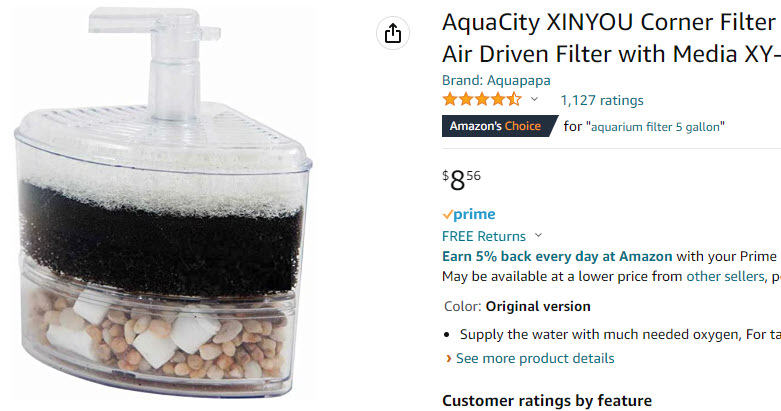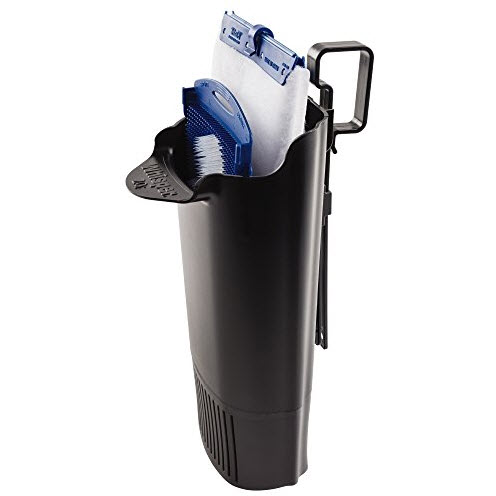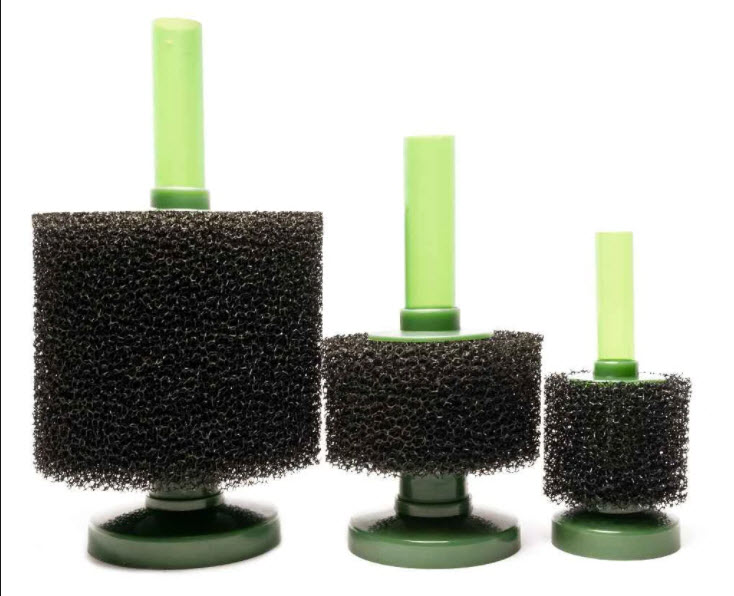Let me make one thing very clear:
SMALL filters do decent filtration in SMALL aquariums with SMALL numbers of SMALL fish
Do not put a small filter in a 30 gallon (100 liter) tank with five angelfish, three pearl gouramis and five swordtails and expect to have an ammonia free aquarium with crystal clear water. It won’t happen.
Box or Corner Filter
A filter that used to come with all aquarium kits sold was a box filter or corner filter. These filters are still sold for betta aquariums and the like. They are very cheap, as low as $3. If these small in tank filters are filled with a good media such as plastic pot scrubbers or static K1 media and cleaned very rarely they can be an decent biofilter for a small aquarium with small numbers of small fish.

Note that unfortunately small corner filters are most often filled with a small amount of ceramic rings which is simply worthless in the aquarium. Also newcomers often clean their filter media to get rid of the “horrible brown gunk”. They don’t realize this “gunk” is their beneficial bacteria. Poor media and/or frequent cleaning guarantee a small filter won’t do much of ANYTHING, even in a small aquarium with a small bioload.
The other filter media often seen in these corner filters is polyester floss. This floss is typically packed in tightly. Because it is packed in tightly it rather quickly becomes plugged and needs to be replaced every week or so. This insures that the filter will not do its main job, namely rendering ammonia harmless. So polyester floss is NOT a good idea.
Cartridge Filters
Most small aquarium kits sold now have small in tank cartridge filters.

There are also a whole series of small hang on back cartridge filters sold for the small aquarium. These have the same features as the in tank cartridge filter, they are just outside the aquarium.
.

The plastic inserts found in some of them will become coated with brown gunk and become very good biofilters. But most of these cartridge filters only have a cartridge. If these filters have only the cartridges they are pretty worthless, especially if they are replaced per the directions on a monthly basis. If they are modified with foam insets as shown by Cory of Aquarium Co-op (see the chapter on hang-on-back filters), they become decent small filters.
Small Sponge Filters
Another useful commercially available small filter is the small sponge filters. These are excellent for small tanks but many don’t like their aesthetics. The foam surface becomes covered in rather ugly goop after a while. If one has a small five or ten gallon tank I recommend using a small Aquarium Co-op sponge filter with an airstone and a decent sized air pump. Just do not clean with more than two squeezes in a bucket of water. Never clean a sponge filter under running water. And only clean once every two months or so.

Air Operated Fluidized Bed Filters
Then there are small in tank fluidized bed filters put out by Ziss, Aqqa and Qanvee. These have the same problem bottle filters have. These filters have no air lift tube. Without a lift tube there is very little water movement THROUGH the filter, from and to the aquarium. This means this filter design simply can’t work. There are several brands that seem to have the same design and the same problem.

.
Upettools Boxtech Fluidized Bed Filter
One small aquarium filter is a fluidized bed/foam filter which will actually work very well. It is the Upettools Boxtech Filter. It combines an airstone with sponge and a tiny fluidized bed. It has an air lift tube and will move the water through the filter. This is a very good design for a small aquarium under 20 gallons (75 liter).
.

Small Powerhead/Foam Filters
There are a whole series of small filters that use powerheads in combination with foam. Just pack the whole thing with the large pore foam and leave it be (ignore the directions that say to replace the foam frequently). These are decent filters for small aquariums 20 gallons (75 liter) and under.

Small Do It Yourself (DIY) Filters
There are a whole series of DIY filters which can be made quite cheaply. Some of these are VERY good options for ANY aquarium. They can be found in this article:


